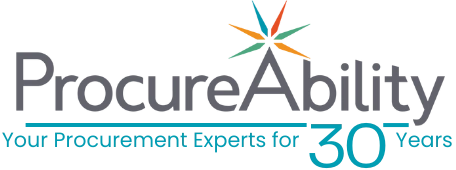
Blockchain technology has moved far beyond cryptocurrency and it’s starting to reshape how procurement and supply chains operate. At a recent “Business of Blockchain” panel hosted by CalTech, industry leaders explored current and emerging applications of blockchain across multiple sectors.
ProcureAbility joined a lineup of experts including USC professor and RSA Security co-founder Leonard Adleman. The packed, standing-room-only event brought together technologists, legal experts, and procurement professionals to explore blockchain’s business potential, particularly in supply chain transparency and procurement automation.
What Is Blockchain?
Blockchain is a digital ledger where transactions are recorded in a secure, chronological, and immutable way. While it’s often associated with cryptocurrencies, its applications now span healthcare, finance, logistics, and procurement. Unlike traditional databases, blockchain operates on a distributed network. This makes it ideal for environments where multiple parties need access to a single source of truth, with security, traceability, and trust built in.
Blockchain and Healthcare Data Privacy
One topic of debate was whether blockchain is appropriate for storing personal medical data. Panelists agreed that public blockchains are not suitable for sensitive healthcare records. However, private and permissioned blockchains (like Hyperledger) offer more secure alternatives.
As global regulations like the EU’s General Data Protection Regulation (GDPR) become more stringent, procurement and IT leaders must ensure that any solution complies with privacy and data retention standards.
Supply Chain Transparency and Efficiency
Supply chain management emerged as one of the most promising areas for blockchain adoption. Today, procurement leaders face major transparency challenges. A global survey of over 500 procurement professionals revealed that 65% have limited or no visibility beyond their Tier 1 suppliers.
Blockchain addresses this by enabling a shared, tamper-proof record of all transactions across the supply chain. With access permissions in place, suppliers, logistics partners, and buyers can verify data without redundant cross-checking.
This level of supply chain visibility not only builds trust, it also reduces the need for intermediaries, streamlines customs processes, and minimizes delays. For example, Walmart successfully piloted a solution to trace pork shipments in China. The pilot tracked bacon from processing, through shipping, customs, and final delivery – all with full transparency and zero disruption.
Automating Procure-to-Pay with Smart Contracts
Blockchain is also poised to transform the procure-to-pay (P2P) process. Today, many companies delay payments sometimes to manage cash flow, but often at the cost of forfeiting early payment discounts. Smart contracts solve this by automating conditional business rules on the blockchain. These digital contracts execute pre-defined actions, such as triggering payment once a goods receipt is confirmed and the invoice matches the purchase order.
By integrating smart contracts into P2P workflows, procurement teams can:
- Improve payment accuracy
- Reduce manual intervention
- Capture early payment discounts
- Strengthen supplier relationships
This level of automation is especially valuable in global supply chains where complexity and timing create friction.
Blockchain Adoption: Still Early, but Growing
While the financial sector has led the way, adoption in procurement and supply chain is still in early stages. Most activity today involves proof-of-concept pilots, but full-scale deployments are coming, particularly in logistics, healthcare, and pharmaceutical industries. Audience engagement at the CalTech event was high, underscoring growing interest across sectors. As blockchain matures, forward-thinking procurement leaders have a chance to gain a competitive edge by adopting early and scaling strategically.
Blockchain’s Strategic Role in Procurement
Blockchain won’t replace traditional systems overnight, but its role in procurement is becoming increasingly clear. From enabling real-time supply chain visibility to automating smart contracts in the P2P cycle, it helps procurement deliver more value with less friction. Companies that embrace it now will be better positioned to manage risk, optimize cash flow, and enhance supplier collaboration in the future. As with many transformative technologies, fortune will favor the bold early adopters.




